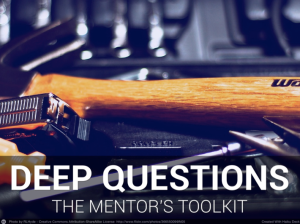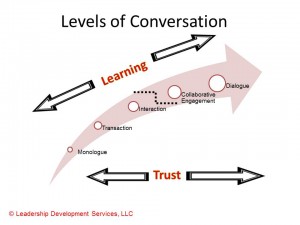
by Center for Mentoring Excellence | Mar 21, 2016 | Goal Setting Conversation, Growth and Development, Mentoring Relationships, Supporting Mentors and Mentees
The Importance of the First 90 Days
It’s a fact: The first 90 days sets the tone for your mentoring relationships! According to Lory Fischler, co-author of Starting Strong (Jossey-Bass 2014), “Many mentoring relationships don’t actually survive the three-month milestone. That’s because they start with good intention and energy but get derailed by lack of time, structure, purpose, progress and accountability.”
We’ve identified six essential conversations that we believe ought to take place during the first 90 days of a mentoring relationship to ensure that it starts strong and stays focused. These conversations set the tone for mentoring success.
Conversation #1: Mentoring partners often jump into mentoring too soon and fail to take the necessary time to get to know one another. When mentoring partners spend time to build their relationship by engaging in real conversation, they are better able to establish the high level of trust that is critical for learning and growth.
Conversation #2: Once trust has been established, it is time to decide how to structure your mentoring relationship and your meetings so that you stay on track. By proactively talking about ground rules, confidentiality, hot buttons and boundaries, mentoring partners avoid problems along the way.
Conversation #3: A robust series of conversations about the mentee’s goals is often more important than the process of formally defining them. Through conversation an effective mentor facilitates mentee understanding about his or her needs and the areas of potential growth necessary to meet those goals.
Conversation #4: Once goals have been identified, it’s time to talk about how to achieve them. This is accomplished by identifying learning opportunities to support and challenge the mentee — to encourage a mentee to stretch and stand outside his or her comfort zone. This where true growth and development occur.
Conversation #5: Along the way, there may be stumbling blocks that get in the way of the relationship. Holding a conversation to address them as soon as they occur keeps the focus on progress and forward movement.
Conversation #6: The three-month milestone is ideal for holding a two-way feedback check-in conversation. By addressing meaty questions (i.e., “What has been the biggest learning to date? What are we doing that is providing value? What is working and what could be better?”) both mentor and mentee receive feedback that enables them to elevate their individual skills.
You won’t want to miss our day-long conference, Making Mentoring Matter: Strategies and Tools for Individual Development and Organizational Effectiveness on Wednesday. May 4, 2016 in Bellevue, WA., where Lory Fischler will be presenting a workshop entitled “Starting Strong: The First 90 Days.”

by Center for Mentoring Excellence | Jun 12, 2015 | Growth and Development, Making Mentoring Work For You
By: Lois Zachary
I was excited to see What Do You Do With An Idea? hit the Wall Street Journal top ten bestselling hard cover nonfiction book list. I received my copy of Kobi Yamada’s book more than a year ago as a thank you gift from my mentee, Linda.
I treasure it because it came from her and because the story parallels our mentoring journey together. Like the character in the story, she developed the confidence and competence she needed to take her ideas, grow them and significantly influence others as they blossomed.
Mentees come to us with ideas, ideas they may not yet have articulated, even to themselves. They may have snippets of ideas, glimmerings of ideas, or even half-baked ideas.
Once they surface in conversations with us, our mentees begin to wonder what they are going to do with their ideas — where they are going with them or if they’re worth doing anything with it at all.
Ideas have a habit of clinging to us like sticky paper. Our ideas remain in our heads even when not pursued — after all, they are our ideas. Some mentees lack the confidence to share their ideas for fear of embarrassment or rejection.
In the Yamada story, a child’s idea begs for his attention. He ignores it (even though it still bubbles up from time to time) until one day he summons up the courage to talk about his idea. And, when he does, the reaction to it is negative and gives him pause, but only for a short while. He begins to dream about his idea. Dreaming energizes him — makes him feel more alive. His confidence grows alongside the passion for his idea.
 As he becomes more self-aware, his worldview and perspectives expand. He discovers that having different ideas is okay. He comes to own his idea because it is, after all, his.
As he becomes more self-aware, his worldview and perspectives expand. He discovers that having different ideas is okay. He comes to own his idea because it is, after all, his.
I think the book jacket sums it up nicely: This “is a story to inspire you to give your ideas some time and space to grow and to see what happens next.”
“Lois, when I came across this book, I knew it was what I wanted to give you as a thank you. You have worked with me, with my head full of scattered ideas for four years now, and you have influenced me so much by your ideas.”
Thank you, Linda! I can hardly wait to hear about your next idea.
by Center for Mentoring Excellence | Apr 28, 2015 | Growth and Development, Making Mentoring Work For You, Mentoring Relationships
Our recent annual Mentoring Matters Reader Survey revealed dozens of best practice topics. This blog is the first in our series of mentoring best practice posts soon to follow. Based on our survey results, here are the top ten:
- Start by getting to know your mentee
- Make sure you take time to get to know your mentee before you jump into the work of mentoring. Nothing of substance will happen until you establish a trusting relationship.
- Establish working agreements
- Agreements lay the foundation of a mentoring relationship. Build in basic structures about how you will work together moving forward. Make sure you and your mentee agree on ground rules.
- Focus on developing robust learning goals
- The purpose of mentoring is to learn. Learning is also the payoff. Make sure the mentee’s learning goals are worthy of your time and effort. Developing robust learning goals takes time and good conversation.
- Balance talking and listening
- It’s easy and natural to want to give advice, especially because you’ve “been there and done that.” But mentees want more than good advice. They want you to listen to their ideas as much as they want to hear what you have to say.
- Ask questions rather than give answers
- Take the time to draw out a mentee’s thinking and get them to reflect on their own experience. Ask probing questions that encourage them to come up with their own insights.
- Engage in meaningful and authentic conversation
- Strive to go deeper than surface conversation. Share your own successes and failures as well as what you are learning from your current mentoring relationship.
- Check out assumptions and hunches
- If you sense something is missing or not going well, you are probably right. Address issues as soon as possible. Simply stating, “I want to check out my assumption which is … ” will prevent you from assuming your mentee is on track.
- Support and challenge your mentee
- Work on creating a comfortable relationship first before you launch into the uncomfortable stretch needed for deep learning. Mentees need to feel supported (comfortable) and yet be challenged (a little uncomfortable) in order to grow and develop.
- Set the expectation of two-way feedback
- Candid feedback is a powerful trigger for growth and change. Set the expectation early on. Be prepared to offer candid feedback, balanced with compassion. Model how to ask for and receive good feedback by asking your mentee for specific feedback on your own mentoring contribution.
- Check in regularly to stay on track
- Keep connected and develop a pattern of regular engagement. Both partners need to be accountable for following through with agreements. By holding an open, honest conversation about how you’re doing and what you need to do to improve, you encourage mutual accountability and deepen the relationship.
What do you think? Did we miss any best practices? Let us know!
Keep a lookout for our next blog later this month, Top Ten Best Practices for Mentees.
by Center for Mentoring Excellence | Jan 23, 2015 | Facilitating Learning, Growth and Development, Making Mentoring Work For You, Mentoring Relationships
Starting Strong walks you through several fictional mentoring examples, highlighting the importance of the first 90 days of a mentoring relationship and pointing out invaluable conversations to have.
One of those fictional examples introduces readers to Rafa.
Rafa is a composite of hundreds of mentees we have worked with over the past 15 years. He’s an ambitious Millennial, and impatient to make it big and fast. To help him on his professional path, Rafa’s company has matched him with a savvy and experienced mentor. This is new for him, and he has no clue what to expect from a mentoring relationship.
Sound familiar? If you’re someone who is new to mentoring like Rafa, our new book, Starting Strong, can help you jumpstart your mentoring relationship and get it on solid footing right from day one.
Starting Strong models mentoring best practices by taking you inside a mentoring relationship, allowing you to observe, feel and experience six key mentoring conversations as they take place.
 As the story evolves over the first 90 days of their mentoring relationship, Rafa comes to appreciate the importance of a good launch, and the critical role preparation plays in moving forward. He learns many lessons about how to build a trusting, open and honest relationship, how to maximize his mentoring time, and how to take charge of his own learning.
As the story evolves over the first 90 days of their mentoring relationship, Rafa comes to appreciate the importance of a good launch, and the critical role preparation plays in moving forward. He learns many lessons about how to build a trusting, open and honest relationship, how to maximize his mentoring time, and how to take charge of his own learning.
The Conversation Playbook that follows the story is jam-packed with strategies, tips and probing questions that you can use to your advantage while working with your mentees.
Here are five ways to use Starting Strong to deepen your relationship, stay on track and raise the level of your mentoring practice:
- Invite your mentees to read Starting Strong and discuss Rafa’s experiences.
- During one of your initial sessions with your new mentee, address the questions at the end of each chapter.
- Prepare for your mentoring meetings by selecting questions from the playbook to deepen your mentoring conversations.
- When you bring your mentoring relationship to closure, give your mentee a copy of Starting Strong as a gift. It will help them prepare for the transition from mentee to mentor.
- And, don’t forget to benchmark your mentoring practices against those described in the book.
Purchase your copy of Starting Strong today!

by Center for Mentoring Excellence | Jul 29, 2012 | Growth and Development
Can you recall the last time when you were engaged openly and respectfully in two-way, free-flowing really great and meaningful conversation? If you are like most people you can probably recall one or two such occasions even though you may be engaging in real conversation less and less these days.
It is ironic that in the very process of connecting with each other, we are actually becoming more and more disconnected. Technology has made connecting more expedient but, at the same time, it has affected how we interact and engage with each other.
Mentoring relationships run the risk of becoming a series of sound bites (text and IM) instead of real conversations. Engaging in conversation increases trust and facilitates learning in a mentoring relationship.
We developed the Levels of Conversation model to illustrate how trust and learning expand relative to the level of conversation that takes place in a mentoring relationship.
Monologue is essentially a non-conversation. It shuts down, rather than invites, conversation. It doesn’t build trust or promote learning. One or the other party claims all the airspace for storytelling, lecturing or expounding.
Most people engage in transaction when they mean to be in conversation. The conversation goes back and forth and remains on the surface. I.e., “Would you do me a favor? Yes. Did you read that article? Good.”
Interactions are useful information exchanges and approximate conversation but still skim the surface. Your mentee asks you how to get something done and you respond by suggesting different ways to get the job done.
Good conversation lives above the dotted line. With the move to collaborative engagement the quality of the interaction shifts. This is where deeper insight and reflection take place. There is more trust and therefore mentor and mentee are both willing to be vulnerable. The conversation and relationship deepen and learning accelerates to a new level.
When conversation becomes dialogue, shared understanding emerges from the mutual learning that is taking place. Because trust is high there is no defensiveness. Conversation is open. As different perspectives emerge, the thinking of mentor and mentee expand.
The further along the continuum you are the more trusting your relationship becomes and the more learning takes place.
 Leadership Questions: Good conversation is the key to building trust and facilitating learning in a mentoring relationship. Where are you and your mentee spending most of your time along this continuum? What do you need to do more of? What do you need to do less of?
Leadership Questions: Good conversation is the key to building trust and facilitating learning in a mentoring relationship. Where are you and your mentee spending most of your time along this continuum? What do you need to do more of? What do you need to do less of?
This just might be the time to have a conversation about conversation and find out!
by Center for Mentoring Excellence | Mar 5, 2012 | Growth and Development
“There is nothing quite as important as having well-defined learning goals in a mentoring relationship. A clear, compelling goal inspires action and is indispensable to the work of mentoring in enabling growth and evaluating the ongoing success of the relationship.”
(The Mentor’s Guide, 2012) (more…)



 As he becomes more self-aware, his worldview and perspectives expand. He discovers that having different ideas is okay. He comes to own his idea because it is, after all, his.
As he becomes more self-aware, his worldview and perspectives expand. He discovers that having different ideas is okay. He comes to own his idea because it is, after all, his. As the story evolves over the first 90 days of their mentoring relationship, Rafa comes to appreciate the importance of a good launch, and the critical role preparation plays in moving forward. He learns many lessons about how to build a trusting, open and honest relationship, how to maximize his mentoring time, and how to take charge of his own learning.
As the story evolves over the first 90 days of their mentoring relationship, Rafa comes to appreciate the importance of a good launch, and the critical role preparation plays in moving forward. He learns many lessons about how to build a trusting, open and honest relationship, how to maximize his mentoring time, and how to take charge of his own learning.



